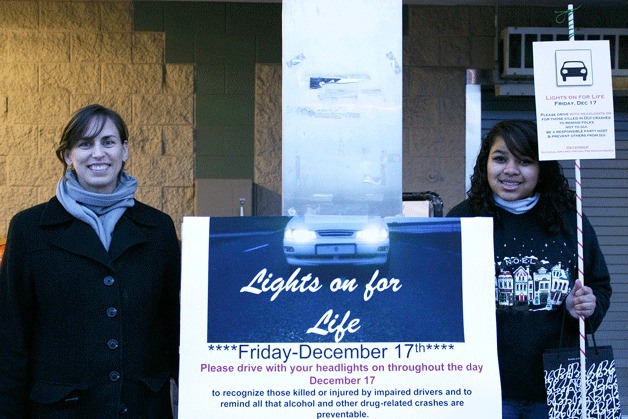I wear two purple bracelets on my left wrist. One is made of thread and was given to me by my mom about this time last year. The proceeds from the bracelet help the women in Zambia get out of the sex trade and support their children. It reminds me of my mother’s support and that I’m not alone. I’ve kept it on to remind me that the world is full of hope.
The other purple bracelet is made of rubber, and I picked it up last week at a driving under the influence prevention panel. It reminds me of a boy I had a crush on in high school. Star football player, stunning smile. He died when he was 19 after crashing his car into a fire hydrant at an excessive speed. I’ve kept it on to remind me during the upcoming weekends that after a few holiday drinks with friends it is unacceptable to drive and it is unacceptable to get into a car with a friend who’s been drinking.
One of the first things I learned in journalism 101 was never to write in first person, and as my editor read the last two paragraphs, I’m sure he cringed at his desk. But I’ve ventured to break the first person rule here because I want my readers to pay attention. This story is about me. And this story is about you. It is about your child, your husband, your sister, your nephew, your best friend and your neighbor two doors down. Whether we are personally guilty of it or not, driving under the influence affects all of us.
“People say we’ve been hearing this forever, yadda, yadda, yadda,” JoAnn Hellman, the director of the Impaired Driving Impact Panel of Island County, said. “Well then why are people still dying on the roads?”
Now maybe you’re considering moving onto the Activities or Sports pages because you know you’re responsible and you know your kids can resist peer pressure, but consider this: According to statistics from the U.S. Department of Transportation, which were adjusted for Whidbey Island, during the holiday season, five out of every 10 nighttime drivers that pass you in the oncoming lane are under the influence. That’s 50 percent. And on a normal weeknight, the number only decreases to 20 percent.
According to Hellman, in Island County, the average age for a person to get into alcohol is 12, but she said she’s heard stories of kids drinking at 7.
A survey administered to Oak Harbor middle and high school students in 2008 revealed that 43 percent of 12th graders, 29 percent of 10th graders and 18 percent of eighth graders had consumed alcohol within 30 days of the test date.
Hellman has hosted more than 285 panels on the island for driver’s education students, parents and court-ordered individuals. Additionally, she goes into the schools and educates students of all ages about making safe decisions.
In July of 1975, Hellman’s sister was walking out to the family’s mailbox when an impaired driver swerved off the road and hit her going 80 miles per hour. Hellman’s sister was thrown about 100 feet, her bones were bent and pushed through her skin, the bottom half of her face was torn off and she was killed. Hellman was told about the incident over the phone.
“When you lose someone like that, it’s a hole in your heart,” Hellman said. “You never get over it … your life becomes a before and after.”
People all over the island have been affected by impaired driving. Coupeville resident Don Growe spent 30 years working as a highway patrol officer in California and said he can’t even recall the high number of DUI cases he witnessed and the number of parents he had to notify of their children’s deaths.
“I probably don’t have to tell you how tough that is,” Growe said. “We hope and pray that bad things don’t happen to us, but life being what it is, things happen.”
Kim Robinett lost her fiance, Michael Smart, on Fort Casey Road in Coupeville six years ago. She had been with Smart for a year and a half at the time and was five and a half months pregnant with his son. Robinett’s son is 5 now, and she said seeing someone everyday who looks like Smart and has his mannerisms is difficult to bear.
“He’s not here with me to share our child together,” Robinett said. “I’m involved with IDIPIC because I want to share that importance with the kids, that you really don’t know what can happen. When you drive drunk, it’s like a video game, you only get so many chances before it’s game over.”
Robinett said her faith has helped her work through a loss that she feels will never fully heal.
Now, I could type another 20 inches about the dangers of mixing drugs and driving, but editorial space in the paper runs tight these days, so I won’t. But as you plan your holiday celebrations, remember that DUIs are 100 percent preventable. And as it reads on my purple rubber bracelet, the best choices are “choices for life.”




